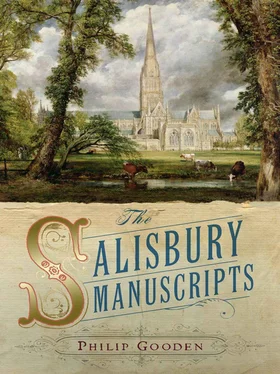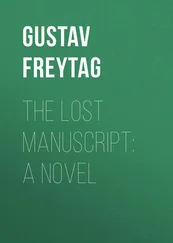Philip Gooden - The Salisbury Manuscript
Здесь есть возможность читать онлайн «Philip Gooden - The Salisbury Manuscript» весь текст электронной книги совершенно бесплатно (целиком полную версию без сокращений). В некоторых случаях можно слушать аудио, скачать через торрент в формате fb2 и присутствует краткое содержание. Год выпуска: 2009, Издательство: Soho Press, Жанр: Исторический детектив, на английском языке. Описание произведения, (предисловие) а так же отзывы посетителей доступны на портале библиотеки ЛибКат.
- Название:The Salisbury Manuscript
- Автор:
- Издательство:Soho Press
- Жанр:
- Год:2009
- ISBN:нет данных
- Рейтинг книги:3 / 5. Голосов: 1
-
Избранное:Добавить в избранное
- Отзывы:
-
Ваша оценка:
- 60
- 1
- 2
- 3
- 4
- 5
The Salisbury Manuscript: краткое содержание, описание и аннотация
Предлагаем к чтению аннотацию, описание, краткое содержание или предисловие (зависит от того, что написал сам автор книги «The Salisbury Manuscript»). Если вы не нашли необходимую информацию о книге — напишите в комментариях, мы постараемся отыскать её.
The Salisbury Manuscript — читать онлайн бесплатно полную книгу (весь текст) целиком
Ниже представлен текст книги, разбитый по страницам. Система сохранения места последней прочитанной страницы, позволяет с удобством читать онлайн бесплатно книгу «The Salisbury Manuscript», без необходимости каждый раз заново искать на чём Вы остановились. Поставьте закладку, и сможете в любой момент перейти на страницу, на которой закончили чтение.
Интервал:
Закладка:
‘We’d better look through these other boxes.’
‘In case there’s a gold bracelet,’ said Helen.
‘For the purpose of our investigation.’
‘Of course.’
The other cardboard boxes, hastily examined, proved to contain much the same assortment as the first one. They discovered the bracelet, however. Gold it might have been but it did not look especially attractive or valuable. The discovery proved that North had been a hoarder, not a thief, otherwise he would surely have attempted to sell the thing. No, judging by these remains, Andrew North had been a magpie even if a knowledgeable and methodical one.
Then Tom and Helen sat down side by side on the narrow bed and looked through the rest of the sketchpad or diary for any hint to the dead man’s fate. Closer to the final entry, the handwriting grew less tidy and the comments seemed to become more personal but less easy to follow. There was the same quotation from Ecclesiastes — And if the tree fall toward the south, or toward the north, in the place where the tree falleth, there it shall be — but without the underlining. There were references to a unnamed person who was surely his sister, Mrs Banks. ( A good woman but she does not approve .’ ‘ Would like to ask but I glare at her and she dare not .) There were even brief descriptions of what might have been dreams ( dark yews — shadowed places — Atropos, beware of Atropos. ).
Helen noticed this last entry and said, ‘Tom, what’s Atropos?’
‘I don’t know.’
But he did know, couldn’t quite bring it to the surface. Something was lurking in his brain, a story he’d heard once, a picture he’d seen somewhere.
They discussed whether they should take the the black-bound diary but decided against it. It did not seem to reveal anything significant about the circumstances leading to the man’s death, after all. Similarly, the contents of the cardboard boxes, though valuable to the late sexton, didn’t appear to provide a sufficient motive for his murder and should remain with his other effects.
They replaced the items in the boxes and restored everything to the cabinet. Helen left the key to the cabinet on the wash-stand, in the place where North could have put it if he’d taken it out of his pocket. Inspector Foster might chance across it when he searched the room. As a competent investigator, he would test it on the locked cabinet and come to his own conclusions.
Tom and Helen went downstairs to say goodbye to Mrs Banks, who was furiously sewing in the little parlour. She was making a repair to a man’s coat. Needle in one hand, a frayed portion of cloth in the other, she was bent forward over the coat, tugging at a thread with her teeth. Tom remembered that she took in neighbour’s clothes to repair. She looked up, dry-eyed, and folded her hands over her work. She said, ‘Work is good. It takes your mind off things. Have you seen enough?’
‘Yes, thank you, Mrs Banks,’ said Tom. ‘We have left the room as we found it.’
‘We are sorry for your loss,’ said Helen.
‘Thank you, my dear.’
The couple went out into the lane that ran outside the terraced cottages.
It was mid-morning by now and the light was stronger. Helen made to loop her arm through Tom’s but he was preoccupied. Before they’d gone more than a few yards he stopped and clicked his fingers. Helen almost laughed, it was so like a man acting badly, acting out the pretence of suddenly recalling something.
‘Atropos!’
He walked a few feet further.
‘Well, are you going to tell me?’
‘It was the sight of Mrs Banks sewing that did it. That and the book on the shelf in her brother’s room.’
‘Yes, you may tell me, Tom. You’ve had enough pleasure at my ignorance and slowness by now.’
‘Atropos was one of the Fates in Greek legend. There were two others — Clotho was one and the third I forgot the name of. The first unreeled the thread of life, the second decided where it should be severed and the third — that was Atropos — she actually did the deed.’
Tom mimed snipping a dangling piece of thread with a pair of scissors.
‘Andrew North was an enquiring man, self-educated. There was a book about Greek myths in his room, a children’s guide. So it would come naturally to him to make that kind of reference — to talk about Atropos with her shears snipping off the thread of life. And there is more. One of the pictures that Felix Slater had in his study was of the three Fates. North probably saw it on the wall, perhaps the Canon explained to him what it meant.’
Tom could hear the excitement in his own voice. He felt elated to have deduced this. To have forged the link between a one-word entry in Andrew North’s diary, a classical picture, a children’s guide and a woman bent over her sewing in her parlour. But Helen looked not so much baffled as disbelieving. He waited, eager to explain more. But his love had already understood and was not impressed.
‘Very good, Tom, but it doesn’t get us any further. I can see what you’re saying but, for all we know, the sex-ton was doing no more than expressing a sense of doom. Perhaps he had a feeling that someone was after him, and his feeling was right. But Atropos isn’t a real person. Unless. .’
Now it was Helen’s turn to grow excited. Rather than click her fingers she clapped her gloved hands though she was encumbered by her bag.
‘Unless it is the Canon’s wife. The mysterious Mrs Slater who I have yet to meet. Atropos is a woman, you say. We saw that entry in the diary about the day Mrs Slater’s dog was buried in the garden. She was upset, rolling her eyes, didn’t he say?’
This time it was Tom’s chance to be sceptical.
‘I don’t think so. I can’t see Mrs Slater killing someone because she didn’t like the way he’d buried her dog. Besides it was months ago, back in the winter.’
Tom and Helen stood facing each other in the lane, silent. A couple of passers-by stared at them, wondering whether they were having a pause in an argument. Eventually the two resumed their progress back towards the cathedral close and the city beyond. There was no more to say for the time being. They’d exhausted the possibilities of Atropos and even Tom had to admit that his insight had provided more sound than light.
As they were walking along the West Walk and coming closer to Venn House, they saw a gaggle of individuals standing just outside the gate, several men and a couple of women. Tom recognized all of them. There was Inspector Foster and Constable Chesney in company with Henry Cathcart, the store-owner and his father’s old comrade, and Mrs Slater. To one side were Eaves the gardener and Bessie the maid. Eaves sneezed violently, wiped his nose with the back of a grimy hand and gave Tom and Helen a lopsided grin, with his gardening tools clanking in the kangaroo-like pouch he wore. Bessie seemed to be imitating her mistress. She was rubbing at tear-filled eyes. Her collar was definitely askew. Tom wondered what Canon Slater would have said, if he were still alive.
Inspector Foster and Mr Cathcart were trying to calm Amelia Slater, who was garbed in black. She was alternating between sobs and gesticulation, oblivious to her surroundings. Cathcart put a hand on her shoulder, only for it to be shrugged impatiently off. The Inspector and his constable stood at a slight distance, not attempting to intervene, though Foster was making futile shoving motions with his hands as if to urge everyone to step back inside, out of public view.
Seeing Tom and Helen, he broke away from the group and met them as they approached. There was relief on his bewhiskered face that he had someone normal to talk to.
‘What is happening, Inspector?’ said Tom.
Читать дальшеИнтервал:
Закладка:
Похожие книги на «The Salisbury Manuscript»
Представляем Вашему вниманию похожие книги на «The Salisbury Manuscript» списком для выбора. Мы отобрали схожую по названию и смыслу литературу в надежде предоставить читателям больше вариантов отыскать новые, интересные, ещё непрочитанные произведения.
Обсуждение, отзывы о книге «The Salisbury Manuscript» и просто собственные мнения читателей. Оставьте ваши комментарии, напишите, что Вы думаете о произведении, его смысле или главных героях. Укажите что конкретно понравилось, а что нет, и почему Вы так считаете.












